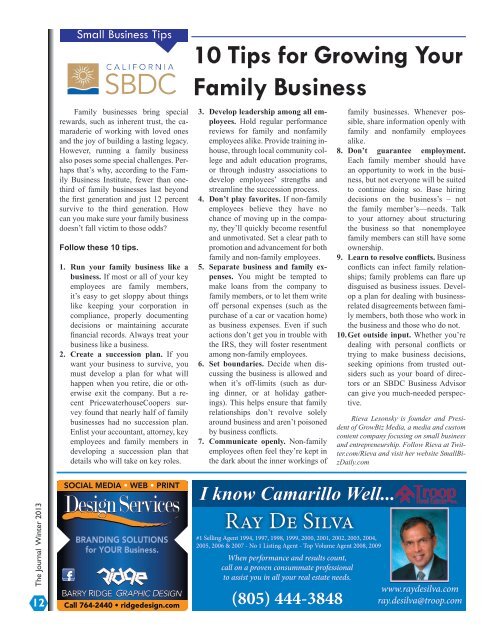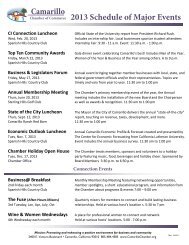Winter 2013 - Camarillo Chamber of Commerce
Winter 2013 - Camarillo Chamber of Commerce
Winter 2013 - Camarillo Chamber of Commerce
Create successful ePaper yourself
Turn your PDF publications into a flip-book with our unique Google optimized e-Paper software.
Small Business Tips<br />
Family businesses bring special<br />
rewards, such as inherent trust, the camaraderie<br />
<strong>of</strong> working with loved ones<br />
and the joy <strong>of</strong> building a lasting legacy.<br />
However, running a family business<br />
also poses some special challenges. Perhaps<br />
that’s why, according to the Family<br />
Business Institute, fewer than onethird<br />
<strong>of</strong> family businesses last beyond<br />
the first generation and just 12 percent<br />
survive to the third generation. How<br />
can you make sure your family business<br />
doesn’t fall victim to those odds?<br />
Follow these 10 tips.<br />
1. Run your family business like a<br />
business. If most or all <strong>of</strong> your key<br />
employees are family members,<br />
it’s easy to get sloppy about things<br />
like keeping your corporation in<br />
compliance, properly documenting<br />
decisions or maintaining accurate<br />
financial records. Always treat your<br />
business like a business.<br />
2. Create a succession plan. If you<br />
want your business to survive, you<br />
must develop a plan for what will<br />
happen when you retire, die or otherwise<br />
exit the company. But a recent<br />
PricewaterhouseCoopers survey<br />
found that nearly half <strong>of</strong> family<br />
businesses had no succession plan.<br />
Enlist your accountant, attorney, key<br />
employees and family members in<br />
developing a succession plan that<br />
details who will take on key roles.<br />
10 Tips for Growing Your<br />
Family Business<br />
3. Develop leadership among all employees.<br />
Hold regular performance<br />
reviews for family and nonfamily<br />
employees alike. Provide training inhouse,<br />
through local community college<br />
and adult education programs,<br />
or through industry associations to<br />
develop employees’ strengths and<br />
streamline the succession process.<br />
4. Don’t play favorites. If non-family<br />
employees believe they have no<br />
chance <strong>of</strong> moving up in the company,<br />
they’ll quickly become resentful<br />
and unmotivated. Set a clear path to<br />
promotion and advancement for both<br />
family and non-family employees.<br />
5. Separate business and family expenses.<br />
You might be tempted to<br />
make loans from the company to<br />
family members, or to let them write<br />
<strong>of</strong>f personal expenses (such as the<br />
purchase <strong>of</strong> a car or vacation home)<br />
as business expenses. Even if such<br />
actions don’t get you in trouble with<br />
the IRS, they will foster resentment<br />
among non-family employees.<br />
6. Set boundaries. Decide when discussing<br />
the business is allowed and<br />
when it’s <strong>of</strong>f-limits (such as during<br />
dinner, or at holiday gatherings).<br />
This helps ensure that family<br />
relationships don’t revolve solely<br />
around business and aren’t poisoned<br />
by business conflicts.<br />
7. Communicate openly. Non-family<br />
employees <strong>of</strong>ten feel they’re kept in<br />
the dark about the inner workings <strong>of</strong><br />
family businesses. Whenever possible,<br />
share information openly with<br />
family and nonfamily employees<br />
alike.<br />
8. Don’t guarantee employment.<br />
Each family member should have<br />
an opportunity to work in the business,<br />
but not everyone will be suited<br />
to continue doing so. Base hiring<br />
decisions on the business’s – not<br />
the family member’s—needs. Talk<br />
to your attorney about structuring<br />
the business so that nonemployee<br />
family members can still have some<br />
ownership.<br />
9. Learn to resolve conflicts. Business<br />
conflicts can infect family relationships;<br />
family problems can flare up<br />
disguised as business issues. Develop<br />
a plan for dealing with businessrelated<br />
disagreements between family<br />
members, both those who work in<br />
the business and those who do not.<br />
10. Get outside input. Whether you’re<br />
dealing with personal conflicts or<br />
trying to make business decisions,<br />
seeking opinions from trusted outsiders<br />
such as your board <strong>of</strong> directors<br />
or an SBDC Business Advisor<br />
can give you much-needed perspective.<br />
Rieva Lesonsky is founder and President<br />
<strong>of</strong> GrowBiz Media, a media and custom<br />
content company focusing on small business<br />
and entrepreneurship. Follow Rieva at Twitter.com/Rieva<br />
and visit her website SmallBizDaily.com<br />
The Journal <strong>Winter</strong> <strong>2013</strong><br />
12<br />
Call 764-2440 • ridgedesign.com<br />
I know <strong>Camarillo</strong> Well...<br />
Ray De Silva<br />
#1 Selling Agent 1994, 1997, 1998, 1999, 2000, 2001, 2002, 2003, 2004,<br />
2005, 2006 & 2007 - No 1 Listing Agent - Top Volume Agent 2008, 2009<br />
When performance and results count,<br />
call on a proven consummate pr<strong>of</strong>essional<br />
to assist you in all your real estate needs.<br />
(805) 444-3848<br />
www.raydesilva.com<br />
ray.desilva@troop.com







